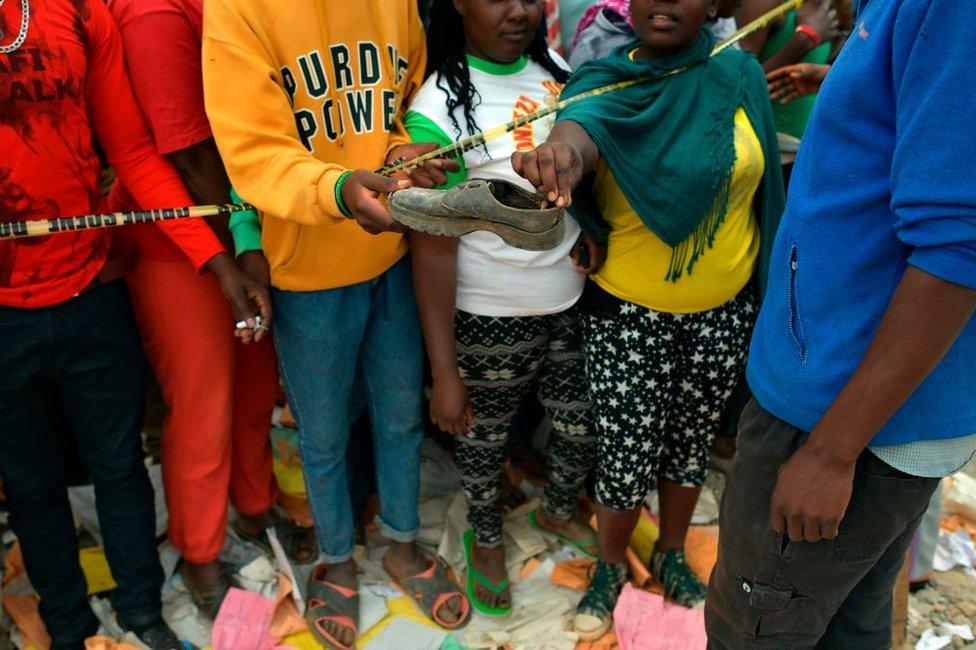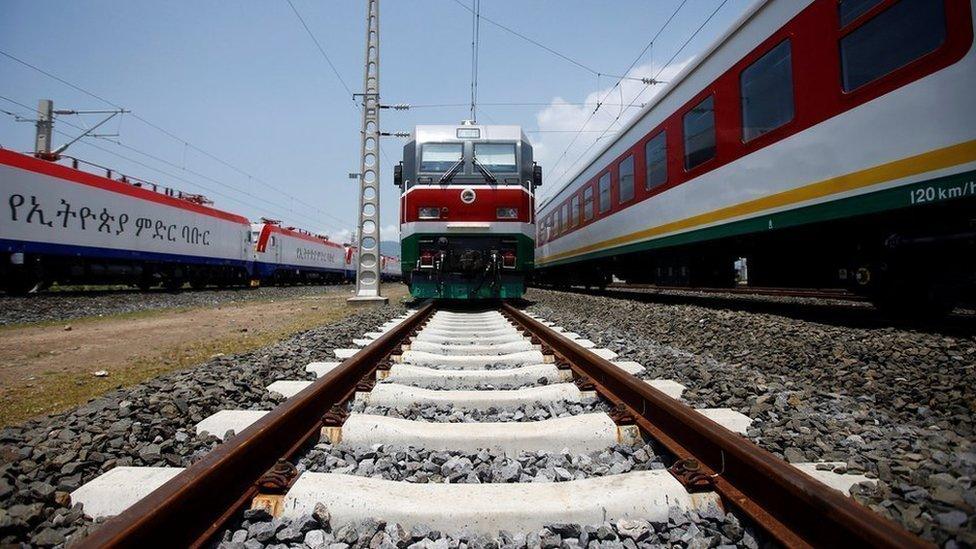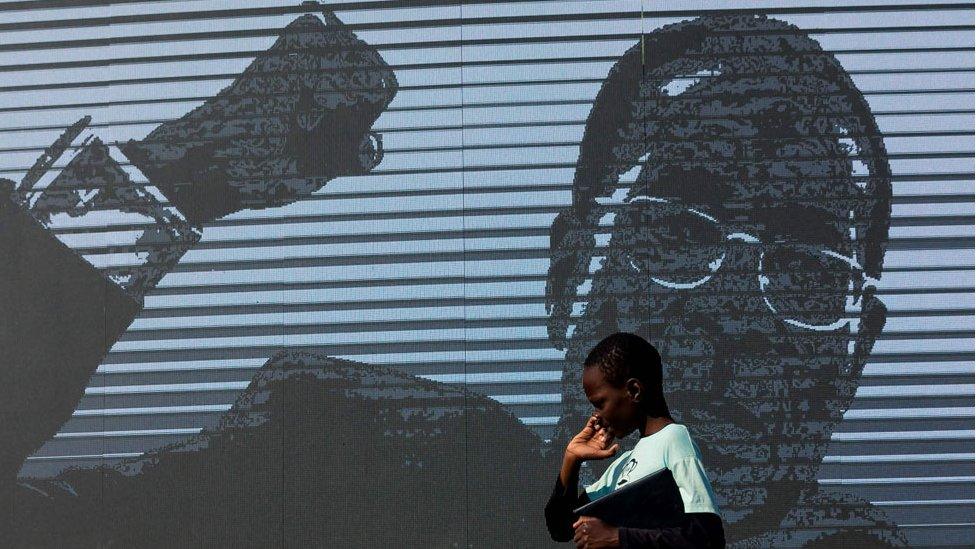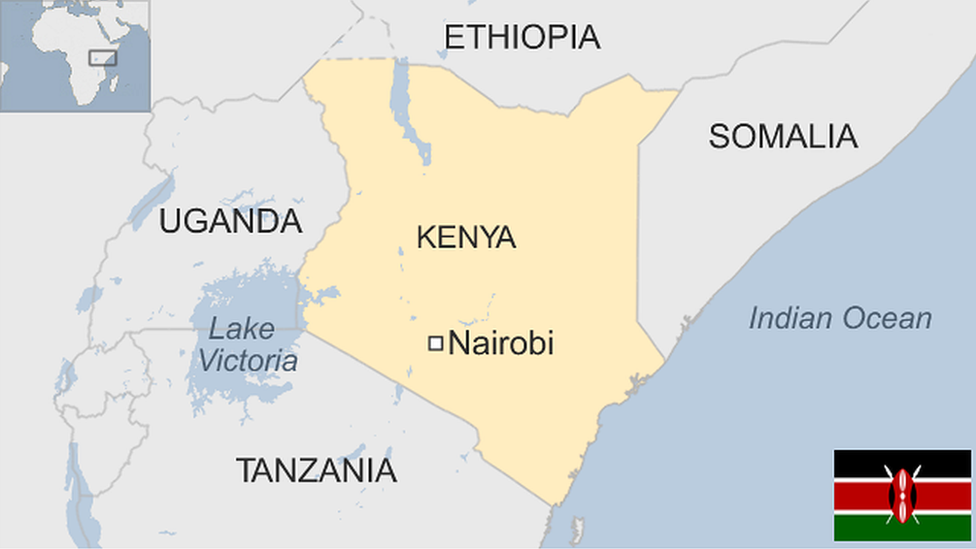Letter from Africa: Why Kenyans never quit
- Published

Residents find a discarded shoe at the site of a school collapse which killed eight children

In our series of letters from African writers, Kenyan journalist Wahiga Mwaura says heads must roll after deadly disasters, yet very few officials seem to be held accountable.
The phrase "winners never quit and quitters never win", coined by the late American Football player and coach Vince Lombardi, could also describe the mentality of many Kenyan civil servants.
Not the part about being winners but rather about never quitting - especially when disasters happen under their watch.
Kenyans have been outraged by two tragedies in the past fortnight that most would agree were preventable and ought to have led to resignations.
As I write this, divers are being despatched to Kenya from South Africa to search for the bodies of a 35-year-old woman and her four-year-old daughter in the Indian Ocean.
'Mind-boggling'
Just over a week ago, the pair had been travelling on a car ferry in Kenya's busy Likoni channel when their vehicle slid off and sank with them inside.
It boggles the mind how this came to pass, considering that any vehicles aboard a ferry should be fully secured before it can set off.
It is possible that the driver made a mistake. Nonetheless there should have been a safety plan in place and divers on stand-by. But there were none.
To add insult to injury, the ferry company went on to wish everyone a "blessed and fruitful day" on its social media pages later that day. It angered many Kenyans.
Allow X content?
This article contains content provided by X. We ask for your permission before anything is loaded, as they may be using cookies and other technologies. You may want to read X’s cookie policy, external and privacy policy, external before accepting. To view this content choose ‘accept and continue’.

When the management of state-owned Kenya Ferry Services (KFS) finally spoke to the media on Monday, they stuck to an uninspiring script about rescue efforts, but did not talk more about accident prevention.
As yet, the bodies still have not been recovered from the sea.
The never-quit attitude of those in charge of our ferry services is not peculiar in a country where civil servants swagger around like ambassadors seemingly with diplomatic immunity.
Sadly, there are other examples.
A fortnight ago, eight children were killed when their school building in the capital, Nairobi, collapsed during morning lessons.
This incident at Precious Talent Top School, a private day school in Nairobi, prompted national and county governments to spring into action. In typical fashion, they suspended several officials and ordered the demolition of other poorly built schools.
Rescuers attempted to clear debris at Precious Talent Top School in Nairobi
But no-one seemed ready to ask the tough questions: Who could have prevented this disaster in the first place? What about collective responsibility?
What we saw was finger-pointing between regulatory agencies, the local MP, the county government and the national government.
And because the parents of the children who died appear not to have the financial means to seek serious legal redress, the whole incident was swiftly brushed under the carpet.
Civil servants swagger around like ambassadors seemingly with diplomatic immunity
When the privately-owned Patel dam burst in western Kenya's Solai town last year, at least 44 people were killed.
Politicians were quick to express their outrage, and a Water Resources Management Authority spokeswoman said the dam had been built illegally. The farm's manager denied any wrongdoing.
More than a year later, no government officials have lost their jobs and nobody has been convicted for the deaths.

You may also be interested in:

And who will cry out for the 11 endangered rhinos that died last year after a botched relocation attempt from Nairobi National Park to the country's biggest national park, Tsavo East?
According to Kenya's market-leading newspaper Daily Nation, a parliamentary committee pointed an accusing finger at Tourism and Wildlife Minister Najib Balala, external, saying he should take full responsibility for the deaths.
But the minister denied any wrongdoing, and passed the buck on to the agencies that coordinated the relocation.
I could cite yet more examples to prove my argument, that in Kenya nobody in authority takes responsibility when things go wrong.
Until accountability becomes common practice the usual cycle will repeat itself.
Social media activist Phillip Ogola once aptly captured the response of politicians to a disaster as follows: "Rush to the scene, condole families, donate items, issue a tough statement, form a commission, wait for another disaster, repeat above".
Hopefully one day that will change.

More Letters from Africa

Follow us on Twitter @BBCAfrica, external, on Facebook at BBC Africa, external or on Instagram at bbcafrica, external

- Published30 March 2019

- Published9 September 2019

- Published28 September 2019

- Published4 July 2023
